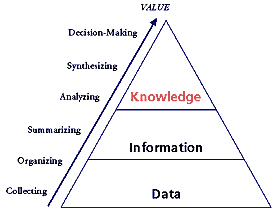Knowledge management and Information
The terms "information" and "knowledge" are often used as though they were interchangeable, when in practice their management requires very different processes.
 |
To manage our natural resources in a sound manner we need to manage
information and knowledge resources effectively. However, as the diagram illustrates, information and knowledge management focus on different parts of the same value chain. |
Knowledge management (KM) focuses on the processes and the people involved in creating, sharing and leveraging knowledge among science, communities, resource managers and policy makers. Some key papers in this area are set out below, and other linked papers in this KM area can be found in the networks page. Information management, in contrast, is more concerned with establishing processes and systems to gather, organise, summarise and package information ... including it's timely delivery to the right decision makers for the situation involved. The two processes are linked in activities that support learning such as you can find on the other pages organisational learning and participatory modeling.
Organisational learning
Within business, learning is a conscious attempt on the part of organisations to improve productivity, effectiveness and innovativeness in uncertain economic and technological market conditions. The greater the uncertainties, the greater the need for learning. Learning enables quicker and more effective responses to a complex and dynamic environment. In turn, effective learning is associated with increased information sharing, communication, and understanding. Because of these reasons the concept of "learning" is probably more pronounced in business than any other area. Although business-oriented papers and research are not widely cited in agricultural, conservation or environmental literature - there are a lot of lessons to be gained from related work in organisational development and learning literature.
Approaches to participatory model building
The two processes both link, and enhance each other in learning-based intititives such as participatory or cooperative model-building. Often one of the best techniques for generating improved thinking at a social level is to use models as an aid to help stakeholders visualise the wider social and bio-physical processes that they cannot see unaided. Many forms of modelling can be used in this way, and underlying methodologies are referred to in different ways such as mediated modeling, conceptual modeling or participatory modeling.
Knowledge management
- Knowedge networks and communities of practice This paper by Verna Allee first describes the new logic driving interest in knowledge management and then focuses on how OD practitioners can participate in that strategic conversation, and support knowledge creation and sharing through building communities of practice.
- Strategic Intentions: Managing knowledge networks for sustainable development This book by Heather Creech and Terri Willard This book is written for practitioners who are working with different models of individual and institutional collaboration. The authors have tried to capture the details of network operations and management: what it really takes to help knowledge networks achieve their potential.
- The Knowledge Solutions series Knowledge Solutions are handy, quick reference guides to tools, methods, and approaches that propel development forward and enhance its effects. They have been developed by By Olivier Serrat and provide numerous handy, quick reference guides to tools, methods, and approaches to knowledge and learningThey are offered as resources to ADB staff. They may also appeal to the wider development community and people having interest in knowledge and learning.
- ABC of Knowledge Management

